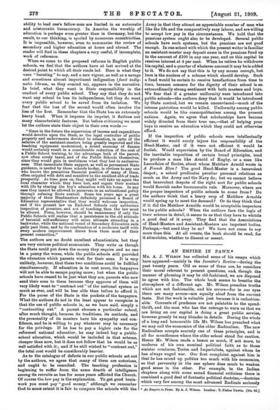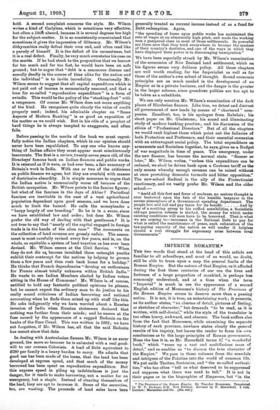AN EMPIRE IN PAWN.*
Ma. A. J. WiisoN has collected some of his essays which have appeared—mainly in the Investor's Review—during the past twenty years. Old as some of them are, he considers their moral relevant to present questions, and though the manner of phrasing it may be old-fashioned, we are disposed to agree with him. The whole book seems to breathe the atmosphere of a different age. Mr. Wilson preaches truths which are not fashionable, and his errors—for in our eyes there are many errors—are equally aloof from the current taste. But the work is valuable just because it is unfashion- able. Counsels of prudence are not palatable to the spend- thrift, and the man who has the courage to warn us that we are living on our capital is doing a great public servicei however grossly be may blunder in details. During the whole of a long and honourable life Mr. Wilson has preached what we may call the economics of the older Radicalism. The new Radicalism accepts scarcely one of these principles, and is all for munificence where the older school stood for caution. Hence Mr. Wilson reads a lesson as much, if not more, to moderns of his own nominal political faith, as to those sinister creatures, Tories and Imperialists, against whom he has always waged war. Our first complaint against him is that he has mixed up politics too much with his economics, so that perversity in the one sphere does much to weaken good sense in the other. For example, in the Indian chapters along with some sound financial criticism there is combined a good deal of fantastic political doctrine,—doctrine which very few among the most advanced Radicals seriously
• din Empire in Pawn. 13y A- J. Wilson, London: T. Fisher Unwin. [108. 6d.]
hold. A second complaint concerns the style. Mr. Wilson writes a kind of Carlylese, which is sometimes very effective, but often a littlt absurd, because it is several degrees too high for the subject-matter. It is so consistently overstrained that sometimes it gives the impression of illiteracy. Mr. Wilson's dithyrambics really defeat their own end, and often read like a parody of himself. It is the defect of his earnestness, but it is a real defect. Finally, he very much overstates his case on the merits. If he had stuck to the proposition that we borrow far too much and far too fast, he would have been on safe ground; but to argue that "debt is a cancerous disease and morally deadly in the course of time alike for the nation and the individual" is to invite incredulity. Occasionally Mr. Wilson seems to suggest that all capital expenditure which is not paid out of income is economically unsound, and that a loan for so-called "reproductive expenditure" is a form of swindle. This would be the policy of the "stocking-foot" with a vengeance. Of course Mr. Wilson does not mean anything of the kind. He recognises quite clearly the value of credit properly used; indeed, his admirable chapter on "Some Aspects of Modern Banking" is as good an exposition of the matter as we could wish. But in his role of a prophet of bard things he is always tempted to exaggerate, and often falls.
Before passing to the merits of the book we must regret- fully notice the Indian chapters, which in our opinion should never have been republished. To any one who knows any- thing of Indian affairs they must appear most mischievously inaccurate. The first is a review, twenty-seven years old, of the Stracheys' famous book on Indian finances and public works. It is reissued as if it were, or had ever been, a fair summary of Britain's work in India. With one or two of the criticisms on public finance we agree, but they are overlaig with masses of doctrinaire absurdity. It is simple nonsense to argue that the Indian native is economically worse off because of the British occupation. Mr. Wilson points to the famine figures ; but what of the famines in the days of Akbar ? Periodical famines are inevitable in the case of a vast agricultural population dependent upon good seasons, and we have done much to limit the hazard. He calls the moneylender a "harpy largely of our breeding." So he is in a sense, since we have established law and order; but does Mr. Wilson prefer the old way of dealing with that gentleman ? It is not true to say that "nearly all the capital engaged in foreign trade is in the hands of the alien race." The comments on the collection of land revenue are grossly unfair. The assess- ment is most carefully revised every few years, and is, on the whole, as equitable a system of land taxation as has ever been devised. Mr. Wilson sneers at the Civil Service. "When they do not die o; become invalided these untaught youths exhibit their contempt for the natives by helping to govern them a few years and then rush back home for a holiday." He thinks that French dependencies "develop an enthusiasm for France almost totally unknown within British India." He wants to see Indian Members elected by Indian voters sitting in the House of Commons! Mr. Wilson is, of course, entitled to hold any fantastic political opinions he pleases, but he cannot expect the ordinary man to do justice to his really sound criticisms of Indian borrowing and national accounting when he finds them mixed up with stuff like this. He asks indignantly why we have worried about a Russian invasion of India when Russian statesmen declared that nothing was further from their minds ; and he sneers at the fuss caused by the appearance of a ragged Bedouin on the banks of the Suez Canal. This was written in 1882; we have not forgotten, if Mr. Wilson has, all that the said Bedouin has meant since that date.
In dealing with Australasian finance Mr. Wilson is on surer ground, the more so because be is animated with a real good- will to our oversee. Colonists. A load of Debt equivalent to 2280 per family is a heavy burden to carry. He admits that good use has been made of the loans, that the land has been developed at express speed, and that much of the money borrowed has been spent on reproductive expenditure. But this express speed in piling up indebtedness is just the danger, for it tends to make borrowing, not a matter for an emergency, but a staple. Instead of clearing themselves of the load, they are apt to increase it. Some of the securities, too, are wasting. The proceeds of land sales have been generally treated as current income instead of as a fund for Debt redemption. Again,
"the spending of loans upon public works has maintained the rate of wages at an abnormally high pitch, and made the working men a pampered class in most of these settlements. So powerful are these men that they tend everywhere to become the masters of their country's destinies, and one of the ways in which they have displayed their power is in discouraging immigration."
We have been especially struck by Mr. Wilson's examination of the economics of New Zealand land settlement, which on his figures seems very dubious policy. All these chapters are well worth reading, for the Imperialist as well as for those of the author's own school of thought. Sound economic principles are as much needed in the development of an Empire as in a private business, and the danger is the greater in the larger scheme, since grandiose politics are too apt to be taken as a substitute.
We can only mention Mr. Wilson's examination of the dark places of Rhodesian finance. Like him, we detest and distrust all government of new lands by means of " chartered " com- panies. Excellent, too, is his apologue from Rabelais ; his short paper on Mr. Gladstone; his sound and illuminating study of modern banking practice; and his discussion of the ethics of "Professional Directors." But of all the chapters we would rank highest those which point out the fallacies of both Protection and Preference, and their essential connexion with an extravagant social policy. The total expenditure on armaments and Socialism together, he says, gives us a Budget of war magnitude in time of peace. The emergency, under the new finance, has become the normal state. "Sooner or later," Mr. Wilson writes, "unless this expenditure can be reduced, we shall be driven back upon a Customs tariff as the only means whereby enough revenue can be raised without at once provoking domestic turmoils and bitter opposition," The new-school Radical is the ally of the Protectionist reactionary, and we vastly prefer Mr. Wilson and the older school
:- "Amid all this fret and fever of madness, no serious thought is ever bestowed upon the fate of the humble taxpayer in the serene atmosphere of a Government spending department: The people live and toil and pay taxes for its benefit And by way of a soothing syrup to his ruffled sensibilities, a Socialistic old-age pension scheme is started, the money for which under existing conditions will soon have to be borrowed. Thetis what we are coming to—increases in the National Debt to pay for what is called the maintenance of peace, such exhaustion of the tax-paying capacity of the nation as will render it helpless should a real struggle for supremacy arise between rival Governments."







































 Previous page
Previous page